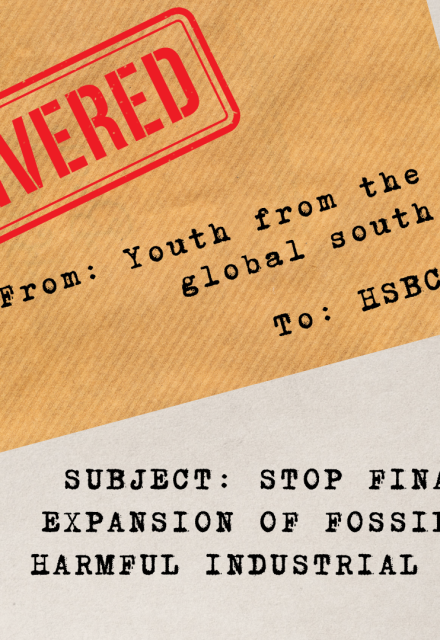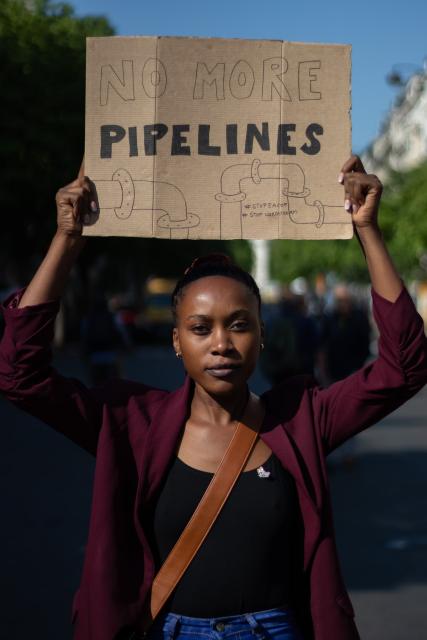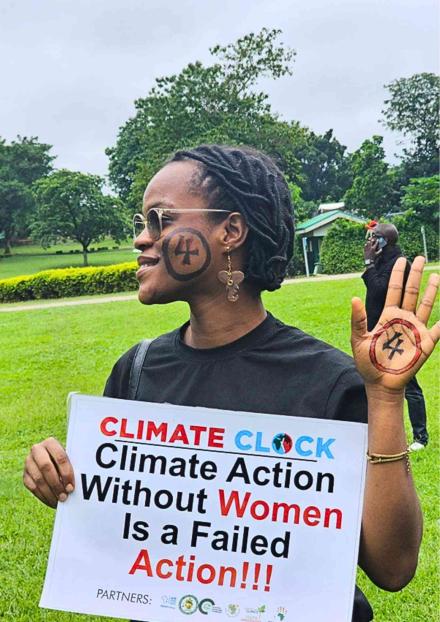“COP29 is not just another climate conference. It is a critical moment for the global community to come together and demonstrate that despite the growing challenges, humanity is capable of addressing the climate crisis with the urgency and determination it demands. The world cannot afford more empty promises or watered-down commitments,” writes Collins Odhiambo, Global Platforms Specialist.
With COP29 beginning today, the world stands at a critical juncture in the fight against climate change. Every year, global leaders, policymakers, scientists, activists, and stakeholders from around the world gather to discuss, negotiate, and forge commitments aimed at mitigating the effects of a warming planet. But as the urgency of the climate crisis grows, so too does the need for real action not just promises, not just pledges, but tangible steps toward a sustainable future.
The stakes have never been higher. Wildfires, hurricanes, droughts, and floods are becoming more frequent and more intense, serving as a reminder that climate change is no longer a distant threat—it’s happening now. The scientific consensus is clear: time is running out to limit warming to 1.5C above pre-industrial levels, the target set by world leaders in the 2015 Paris Agreement to avoid the worst impacts of climate change. This COP, the latest in a line of annually held COPs since 1995, taking place from 11th November 2024 – 22 November 2024 in Baku, Azerbaijan offers a pivotal opportunity for governments to demonstrate leadership, accountability, and ambition in addressing the growing crisis.
What Have We Learned?
The conference in Dubai held last year, saw significant advancements in certain areas, such as the establishment of the Loss and Damage Fund—an acknowledgment that nations in the Global South who bear the brunt of escalating climate disasters deserve financial support while they struggle under crushing debt and inadequate funding. However, many critics argue that the progress made was not enough to meet the scale of the crisis we face. Ambition levels remain inconsistent, and there’s still a massive gap between pledges and actual emissions reductions. The conversations about climate change have been the same every day, the same words heard repeatedly during the past decade. As COP29 begins, it’s essential to ask: What lessons have we learned from previous summits? Are we ready to accelerate progress, or will the cycle of delays, standoffs, mistrust, differences in opinion and insufficient action continue?
The Need for Urgency
The effects of climate change are no longer a scientific prediction, but a lived reality for millions of people. From the record-breaking heatwaves in Europe and North America to devastating floods in Bangladesh and the recent droughts in East Africa, the global community is witnessing firsthand the destructive force of a warming planet.
The Baku summit expected to be a “finance COP,” sharp in focus on mobilizing the trillions of dollars required for mitigation and adaptation against climate change needs to be more than just a summit. It must be a watershed moment for climate action. Governments, businesses, and civil society groups must push past their differences and prioritize the long-term survival of our planet and future generations. The window of opportunity to limit global warming to 1.5°C is closing fast, and the urgency of this moment cannot be overstated.
COP29 offers a historic opportunity to turn these proposals into action. Redirecting financial flows is not only a matter of sound fiscal management but a moral obligation. The future of our planetary home depends on it, and so does the well-being of ordinary people. The money is there for climate action. Now is the time to act.
The Path Forward: Key Issues for COP29
There are several key issues that need to be addressed with concrete action:
1. Strengthening Emissions Reduction Targets:
While many countries have committed to net-zero emissions by 2050, the actual measures taken so far fall short of the necessary emissions reductions. The science is clear—global emissions must peak no later than 2025 and then decline sharply. COP29 must see stronger commitments, backed by robust plans and accountability mechanisms.
2. Climate Finance for Developing Countries:
Wealthier nations have long promised to mobilize $100 billion annually in climate finance to support developing countries, yet this target remains unmet. In recent years, the pledges of developed countries to assist developing countries in addressing climate change have consecutively failed to materialize. For instance, the promise of US$100 billion a year, made at COP15 in 2009, was supposed to be a down payment toward long-term climate finance. However, estimates show that actual delivery on climate finance remains way below this target. In fact, a report by the Organisation for Economic Co-operation and Development (OECD) published in May indicated that only about US$83 billion had been mobilized in 2020, leaving what has been promised far from what is needed up until 2022. Wealthier governments often hide behind excuses like "fiscal responsibility" and "budget constraints" to avoid paying their fair share towards climate action, despite their obligations and commitments under international agreements like the Paris Agreement. Austerity is framed as a necessary shield for their economies, while these same governments quietly funnel billions into fossil fuel subsidies and military spending, sidestepping their historical responsibility for the climate crisis they have caused with their historical emissions. But the truth is, the money to meet an ambitious climate finance goal already exists. And the benefits wouldn’t just be for climate action - they would tangibly improve the day-to-day lives of ordinary people all around the world. COP29 must deliver on these financial commitments and ensure that climate finance reaches the most climate-vulnerable countries. This includes funding for both mitigation and adaptation measures.
3. Adapting to a Changing Climate:
Adaptation measures are becoming increasingly urgent. With climate impacts already unfolding, countries need resources, technology, and expertise to protect their populations from the worst effects. Investing in resilience is just as critical as reducing emissions, and COP29 must lay the foundation for greater global cooperation in this area.
4. Phasing Out Fossil Fuels:
Transitioning away from fossil fuels is perhaps the most contentious issue at every COP. While some countries remain heavily dependent on oil, gas, and coal, the time to invest in renewable energy has long since arrived. Globally, direct handouts to the oil, gas, and coal industries still account for an astonishing $850 billion a year. Governments continue to prop up the very industries that are driving the climate crisis, while the public pays the price in pollution, health costs, increased bills, and ever-worsening climate disasters. COP29 must focus on just transitions—ensuring that workers in fossil fuel industries are supported while pushing for an accelerated shift toward clean energy sources. Phasing out these subsidies would not only free up hundreds of billions for clean energy projects, but also reduce toxic emissions that disproportionately affect low-income communities. Cleaner air and safer homes would become a reality for millions.
5. Loss and Damage:
The concept of “loss and damage” will continue to be a critical issue in COP29 discussions. Countries on the frontlines of climate change often face existential threats due to rising seas, intensifying storms, and droughts. These countries need financial and technical support to rebuild, recover, and protect their citizens. COP29 must address how these funds will be allocated and delivered efficiently.
6. The Role of Young People:
As in past years, youth and activist groups will play a crucial role at COP29. The power of grassroots movements cannot be underestimated. Young people have made their voices heard loud and clear, demanding that leaders take meaningful action today to secure a livable future tomorrow.
At COP29, I hope to see youth voices not only represented, but also listened to and acted upon.
For Baraka Machumu from Tanzania, COP 29 is an opportunity to amplify the voices of African youth and climate struggles of communities, "I want to amplify the voices of African youth and communities facing the direct impacts of climate change and harmful fossil fuel projects, such as EACOP in Tanzania. My goal is to bring attention to the need for climate finance that prioritizes renewable energy solutions and community resilience, especially in regions where environmental and social vulnerabilities are high… As a young person, I am deeply invested in the future of our planet, and I believe that young people, especially those in the Global South, must have a seat at the table when decisions are made. At COP29, I hope to see youth voices not only represented, but also listened to and acted upon. We are the ones who will live with the consequences of today's decisions, and we are also the ones innovating and fighting for a better future. I want to see countries and institutions recognize the leadership of youth and create meaningful spaces for young people to contribute to decision-making processes. This includes formal mechanisms for youth representation in national delegations and decision-making bodies, as well as concrete actions to integrate youth perspectives into climate policies.”
I hope to see countries from Global South being realistic with their exact current situations and not be puppets.
For Valepo Banda from Zambia, Climate change is a lived reality, “Just the previous farming season, Zambia experienced one of the worst El Niño droughts that affected over 6.8 million people and continues to affect the majority of the population currently due to power shortage as 85% of our power is hydro generated…I hope to see countries from Global South being realistic with their exact current situations and not be puppets. I would like to see collective negotiations regarding the adaptation fund and the exact strategy of how it will be financed and what channels it will reach the Global South countries, NOT LOANS!”
There should be a clear focus on ensuring that climate policies are gender-responsive, inclusive, and reflective of the needs of those most affected, such as youth and adolescent girls.
Rodney Mutombo from Zimbabwe wants to see gender responsive climate policies, “As a young person from the Global South, I hope COP29 will address the urgent need for equitable climate action that recognizes and amplifies the voices of marginalized communities, particularly youth and women. I want to see stronger commitments from governments to finance adaptation and resilience-building initiatives, especially in vulnerable regions, where the impacts of climate change are most severe. Additionally, there should be a clear focus on ensuring that climate policies are gender-responsive, inclusive, and reflective of the needs of those most affected, such as youth and adolescent girls. I also hope for tangible progress on loss and damage financing, ensuring that those who have contributed least to climate change are supported in coping with its devastating effects. Finally, I would like to see concrete actions and accountability mechanisms that ensure meaningful participation of young people in climate governance, as we are the future leaders and the ones directly impacted by today's decisions."
As Bangladesh continues to grapple with severe flooding, river erosion, and air pollution, we urgently need developed nations to honour their financial promises and provide the resources necessary for adaptation and resilience building.
For Raihan Noman from Bangladesh, COP 29 is a platform to not just advocate for climate justice, but also amplify local solutions on a global stage, “I am attending COP 29 to advocate for climate justice for Bangladesh and other nations in the Global South, where communities are already bearing the brunt of climate-induced disasters. My focus will be on securing stronger commitments to climate finance, particularly for adaptation and loss and damage, as these are critical for countries like ours to cope with the devastating effects of climate change. As Bangladesh continues to grapple with severe flooding, river erosion, and air pollution, we urgently need developed nations to honour their financial promises and provide the resources necessary for adaptation and resilience building. Through my work with Shurjodoy Youth Society, I have seen how grassroots efforts, such as renewable energy initiatives and community-based climate adaptation, can make a significant difference. At COP 29, I aim to bring these local solutions to the global stage and push for a just transition away from fossil fuels, with support for countries like Bangladesh to lead this change.”
The call for intergenerational justice has never been more urgent, and it is up to world leaders to respond. COP29 is not just about governments negotiating behind closed doors, it’s about responding to the demands of the people who are fighting for their futures. Young people are not only the victims of climate injustice but also the hope towards a better tomorrow that everyone dreams of.
7. Address Global South Debt
Developing countries face a punishing US$29 trillion debt to wealthier nations, with 93% of those most vulnerable to climate change either already in debt distress or at high risk of falling into it. Instead of investing in vital infrastructure, disaster preparedness, or renewable energy - or broader development needs such as health and education - these nations are forced to divert scarce resources toward debt repayments - increasingly to private creditors who now account for two thirds of developing countries’ total external public debt. In fact, the world’s least developed countries spend twice as much servicing debts as they receive in climate finance. Cancelling or restructuring this unsustainable debt would free up billions for urgent climate action and improved public services, enabling communities to recover from climate disasters and build a sustainable future.
A Critical Crossroads
The pressure is on. The next steps we take whether in the halls of the summit or in the streets outside will shape the future of our planet. The time for incremental change has passed. Now, we need bold action, a shared vision, and unwavering commitment.
The world is watching.




